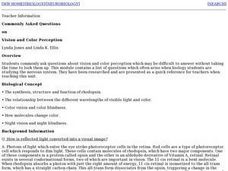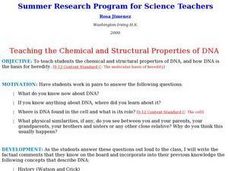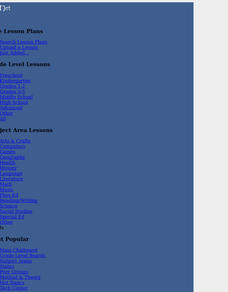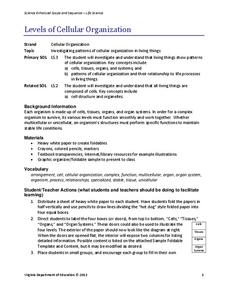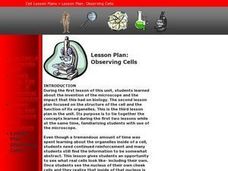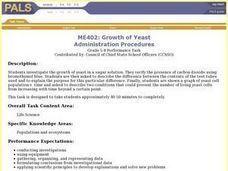Curated OER
Organelles
Students explore the functions of major eukaryotic organelles. They compare and contrast prokaryotic and eukaryotic cells. Given diagrams and drawings, students take turns drawing structures, discussing their function, and labeling...
Curated OER
Tree Friends
Students are introduced to tree structure and use. They identify their special tree using all senses except sight. Students identify six different internal parts within a cross section of tree trunk (bark, phloem, xylem, cambium,...
Serendip
From Gene to Protein - Transcription and Translation
Learners identify the different steps involved in DNA transcription. In this genetics lesson, pupils complete a worksheet and model the translation process with a paper chain activity. They watch a video on sickle cell anemia and explain...
Curated OER
Commonly Asked Questions on Vision and Color Perception
Students commonly ask question about vision and color perception which may be difficult to answer without taking. They use this module that contains a list of questions which often arise when biology students are studying the nervous...
National Center for Case Study Teaching in Science
Bad Fish, Bad Bird
In an advanced biology lesson, learners see a PowerPoint about biologist Dr. Westwood, a two-time victim of poisoning. Designed to be used with clickers in the classroom, you could modify the lesson by creating a worksheet from the...
Curated OER
Teaching the Chemical and Structural Properties of DNA
Students work together to answer questions about DNA. They identify where DNA is found and its function in the cell. They note any physical similarities they have with their family members
Curated OER
Making Blood!
students research blood's components, and use their math skills to recreate a model of whole blood using commonly found food items.
Curated OER
Surface to Volume Ratios
Students measure the rate of diffusion and to calculate the surface area to volume ratios of varying cell sizes. The lesson is very clearly organized with a useful student worksheet provided. They perform a lab experiment which is...
Curated OER
DNA Extraction
Students extract and observe a visible amount of DNA from Escherichia. coli cells. They discuss the properties of DNA. Confirmation of the presence of DNA by a reaction with an indicator is confirmed within this lesson. Many hands-on...
Virginia Department of Education
Levels of Cellular Organization
What an eccentric way to learn about each level of cellular organization! Allow emerging biologists to utilize white paper and create their own foldable charts to describe each level of organization in the body. You may also adapt the...
Curated OER
Small Pox Scare Wks 1-2
Students identify basic similarities and differences between B- and T-lymphocytes, stressing function, location, and role. They complete a worksheet that requires them to apply knowledge about ELISA and antibodies.
Curated OER
Web-search And PowerPoint Presentations-The Cell
Sixth graders create a PowerPoint presentation using information that they have compiled from their web search and rubric web sites, text and other applicable references. They work in pairs to complete these searches and projects.
Curated OER
What is the Relationship Between DNA and Cancer?
Students examine the structure and functions of DNA. They discover the effects radon has on one's DNA and how it leads to cancer. They discuss why DNA is so important to us.
Curated OER
Biology: Understanding Cellular Organelles
Students distinguish the differences between Prokaryotic and Eukaryotic cells. Using microscopes, they examine a variety of plant and animal cells. Working in groups, they draw and label plant and animal cells and show the mathematical...
Curated OER
How To Make an Artificial Organ
Students examine the advances made in technology with regard to prosthetics and replacement organs and limbs. They describe the anatomy and functions of different organs and create their own artificial organ. They defend and present...
Curated OER
What Makes Bones Strong?
Students explore the function of bone, muscle, and skin. Pasta and rubber bands are used to model how minerals and collagen contribute to bone strength. The effects of the reduction of these substances are explored in chicken bones.
Curated OER
Lesson on Proteins
Students examine the importance of proteins including their function and structure. In this protein lesson students play a game to help them better understand proteins.
Curated OER
Biomechanics of Sports
Students examine the body's major organ systems and how they function and influence each other. They examine how the human body moves when involved in sports.
Curated OER
ME402: Growth of Yeast
Students investigate the growth of yeast in a sugar solution. They verify the pressure of carbon dioxide using bromothymol blue. Students are asked to describe the difference between the contents of the test tubes used and to explain...
Curated OER
Cell physiology and chemistry
Students design an experiment to discriminate between chemical diffusion, osmosis, facilitated diffusion and active transport through a membrane. Be specific about predictions and interpretations!
Curated OER
The Meaning of Genetic Variation
Students investigate variation in the beta globin gene by identifying base changes that do and do not alter function, and by using several Internet-based resources to consider the significance in different environments of the base...
Curated OER
Using the Microscope
Students demonstrate their ability to properly make observations using a compound microscope. They prepare an onion skin slide and focus on it in both low and high power. Then they measure the diameter of one of the cells.



